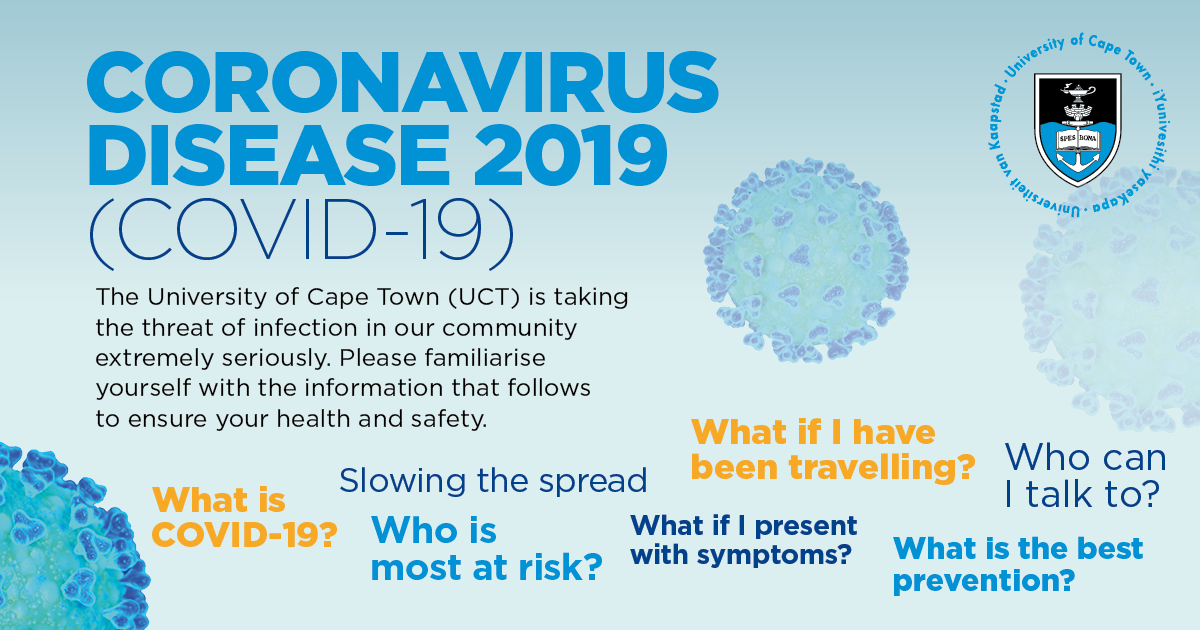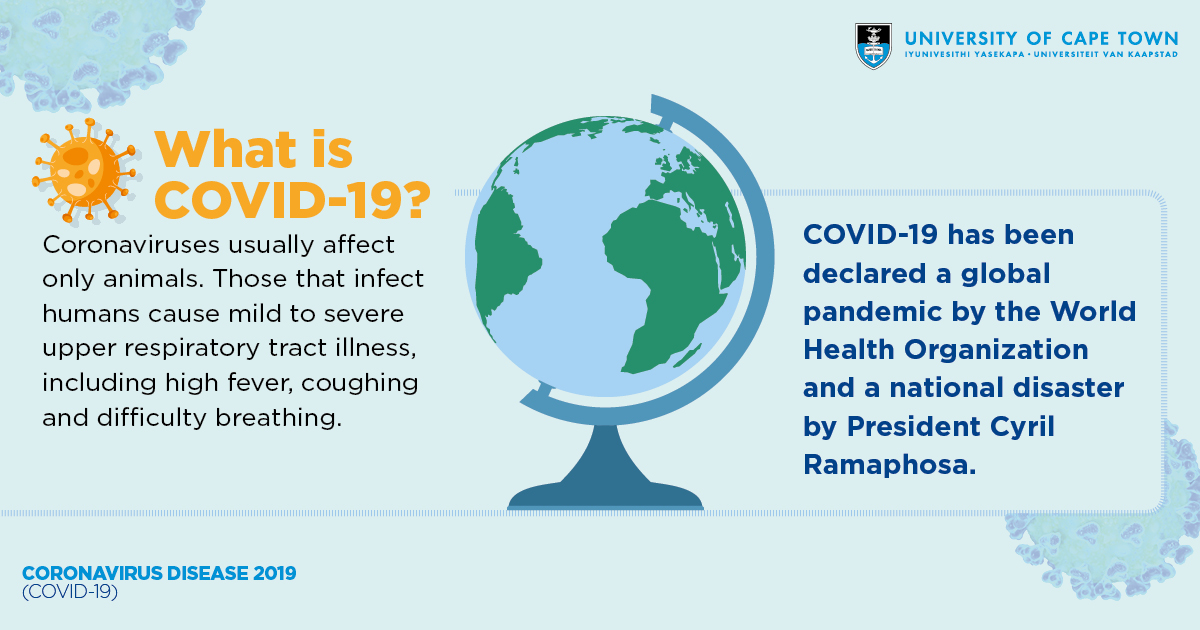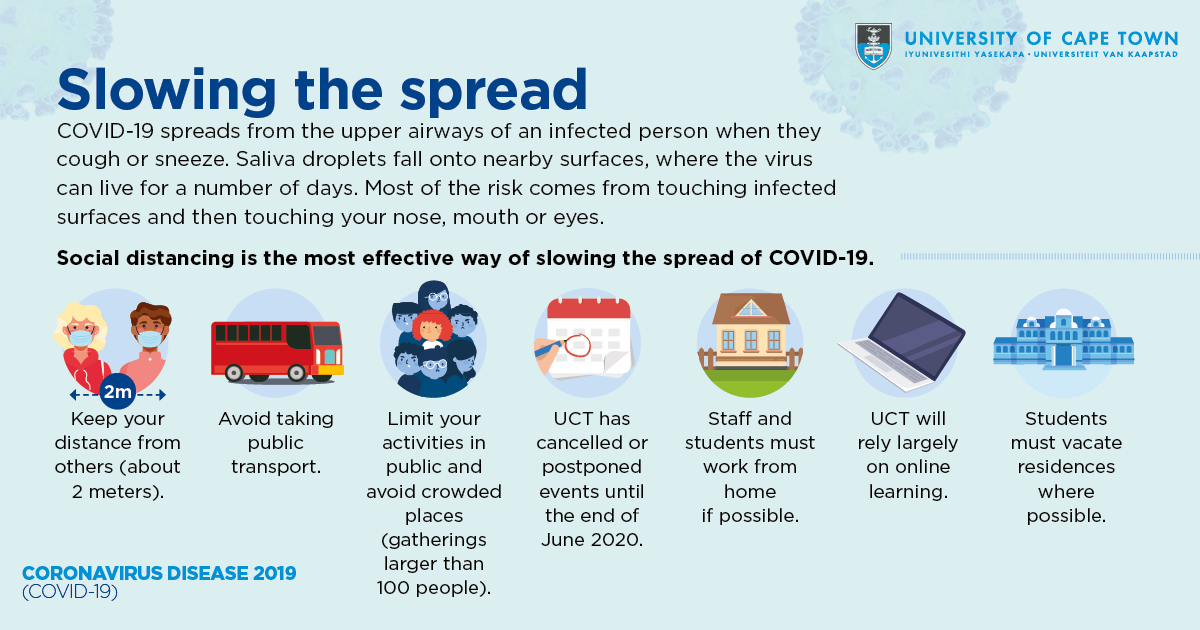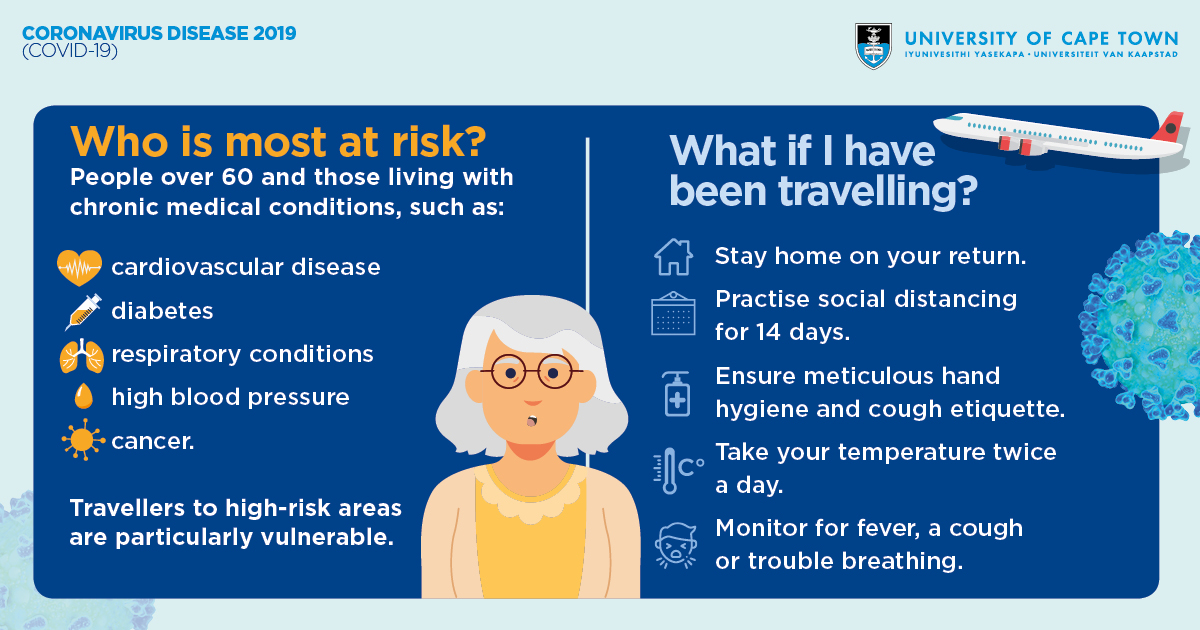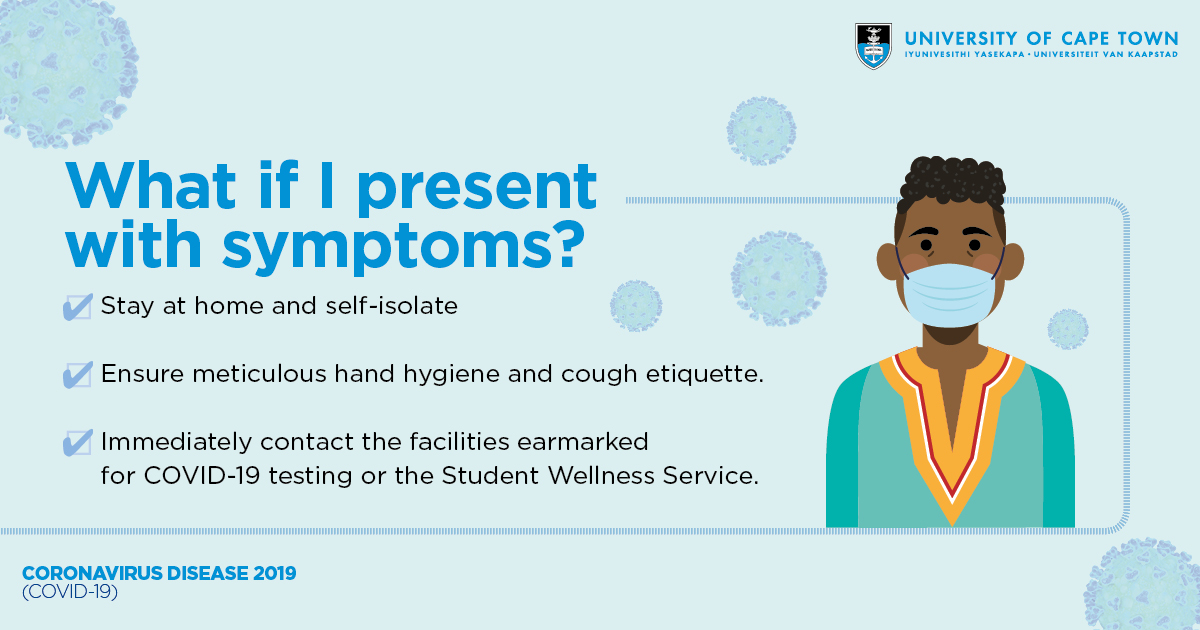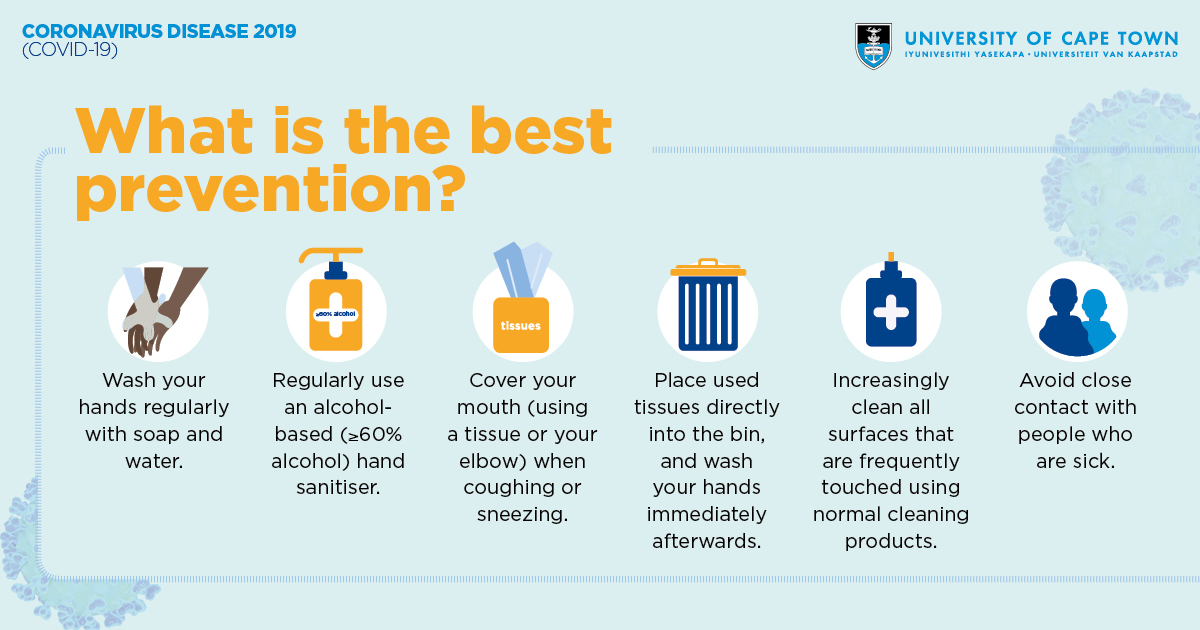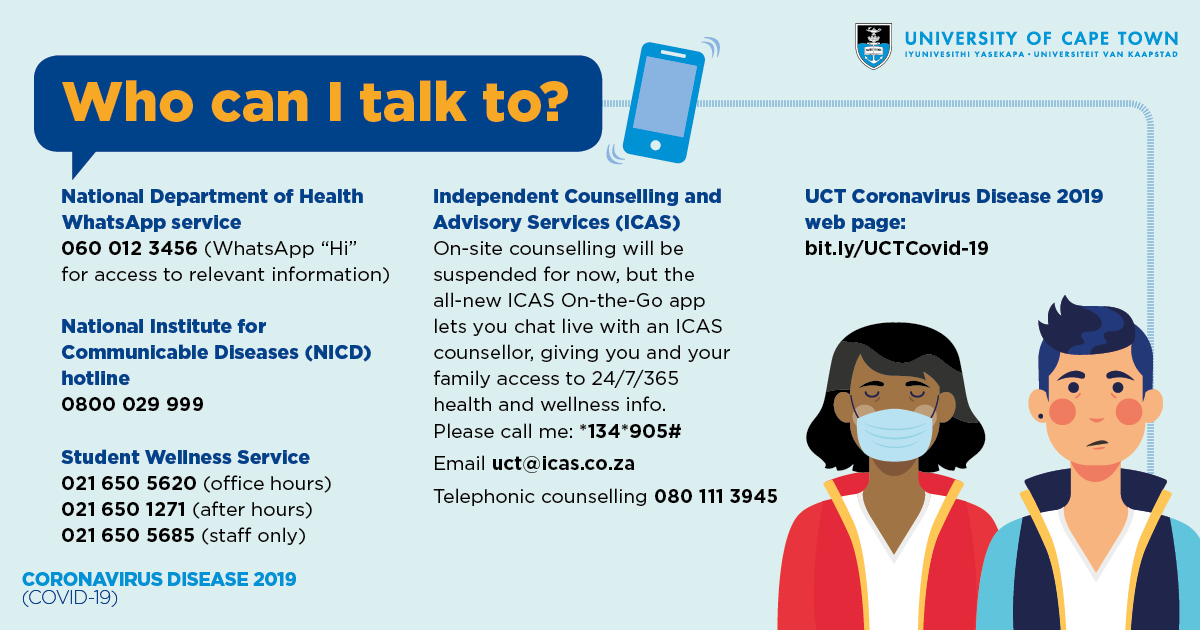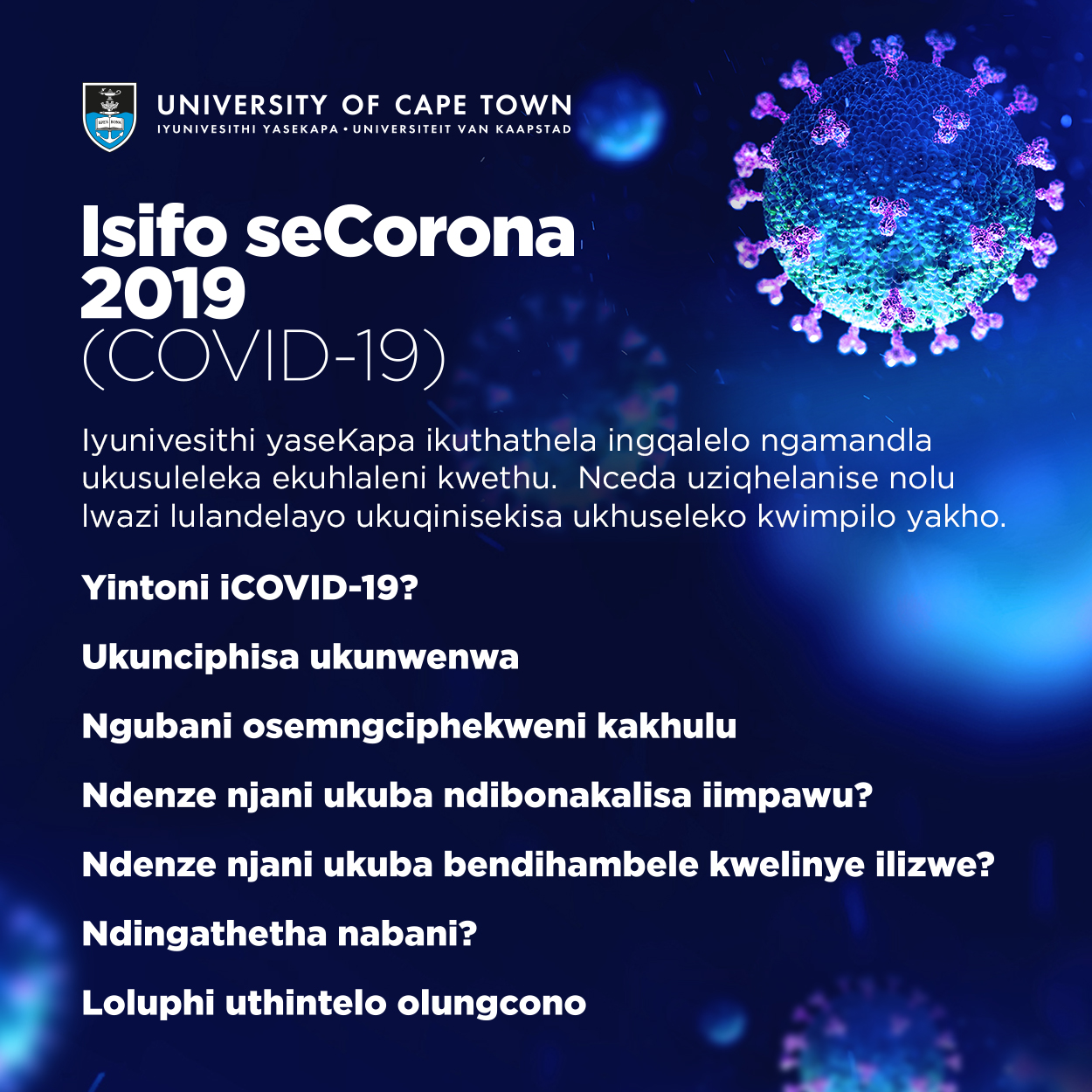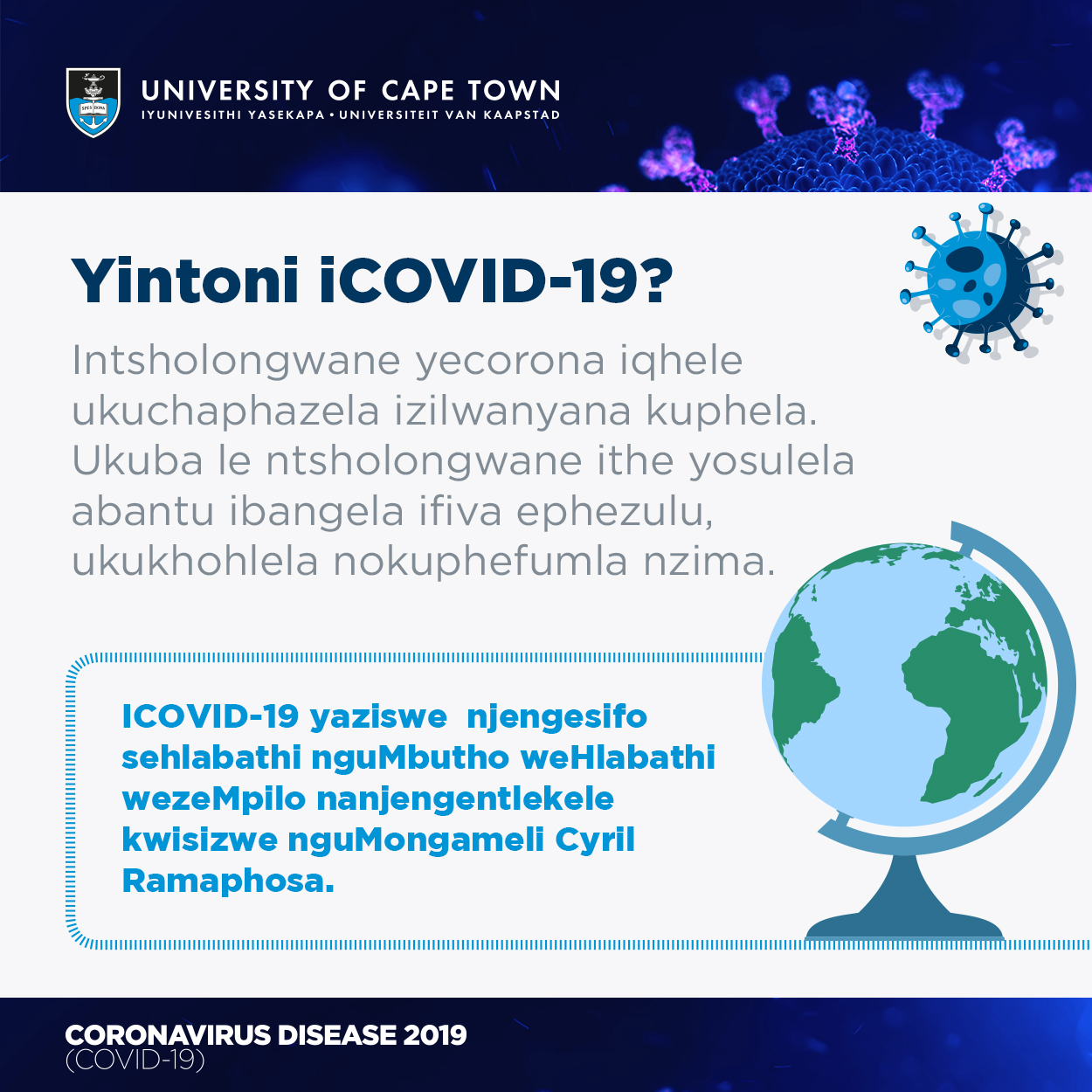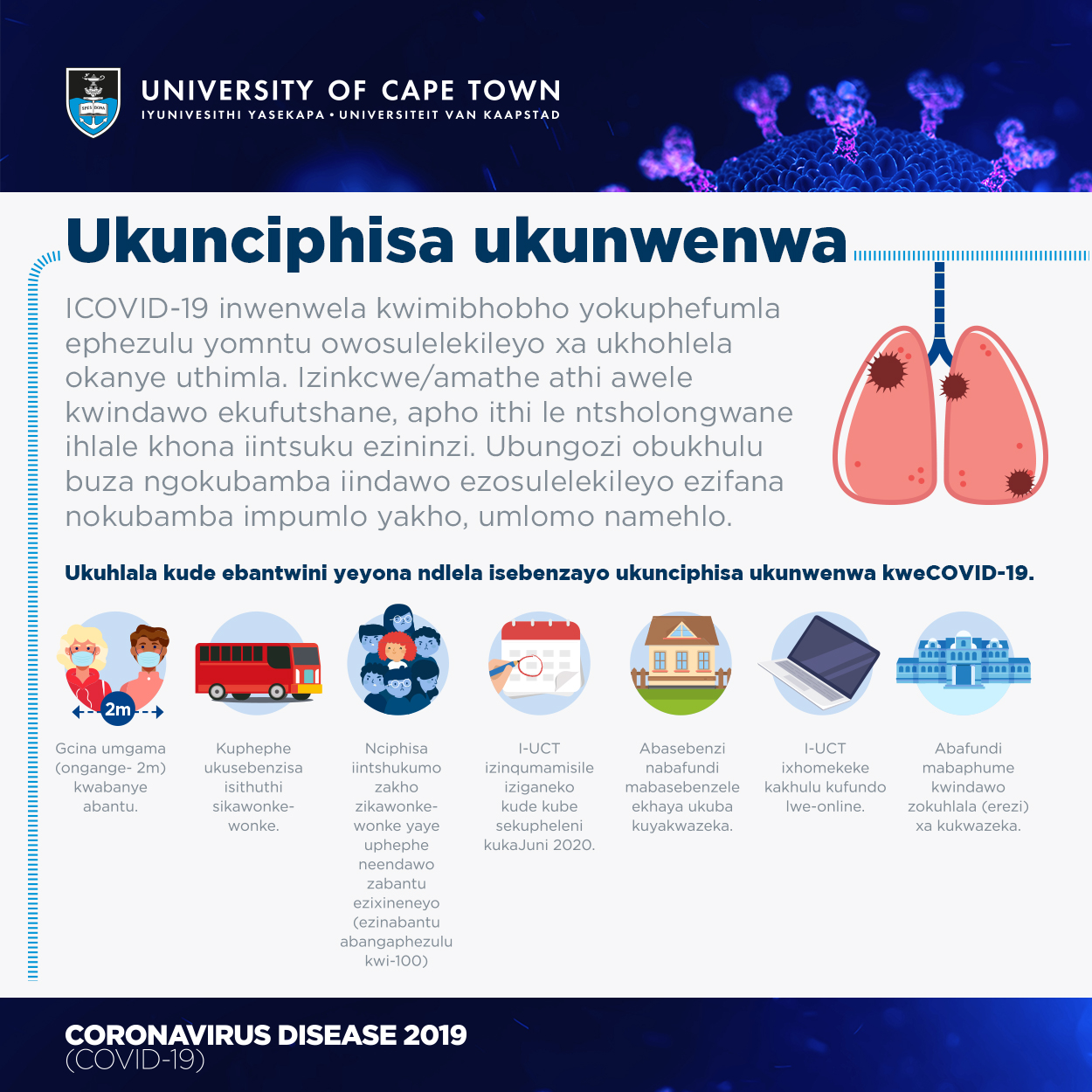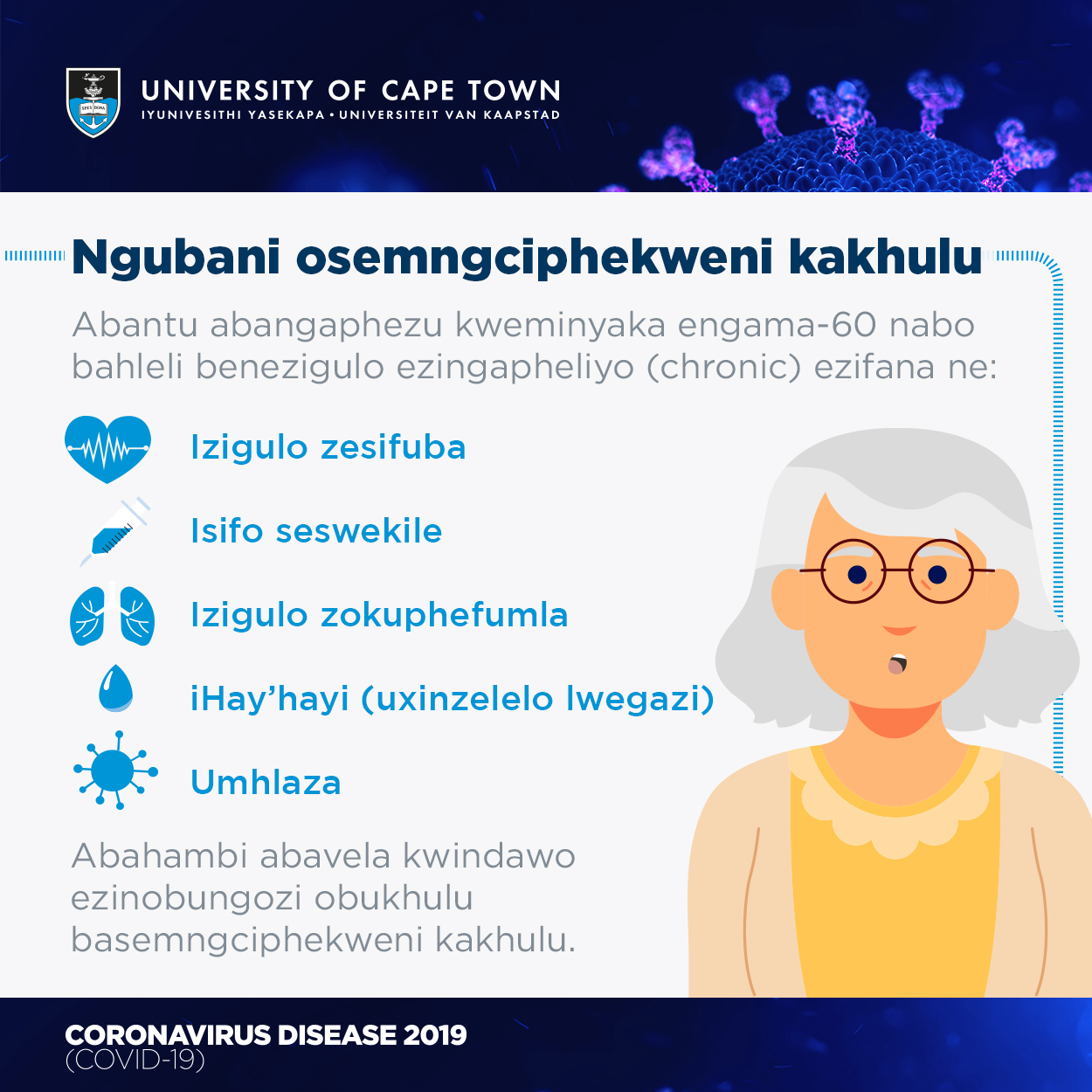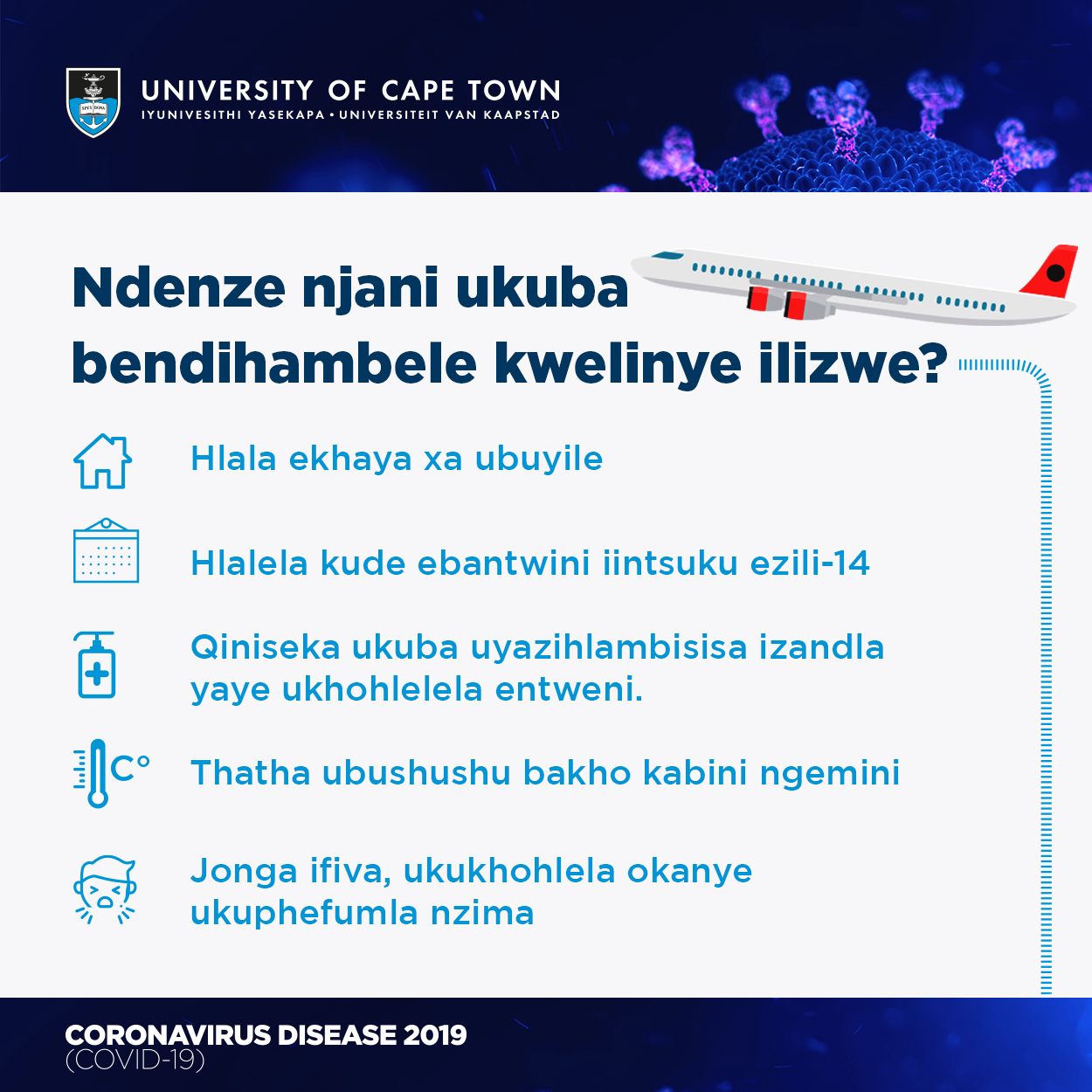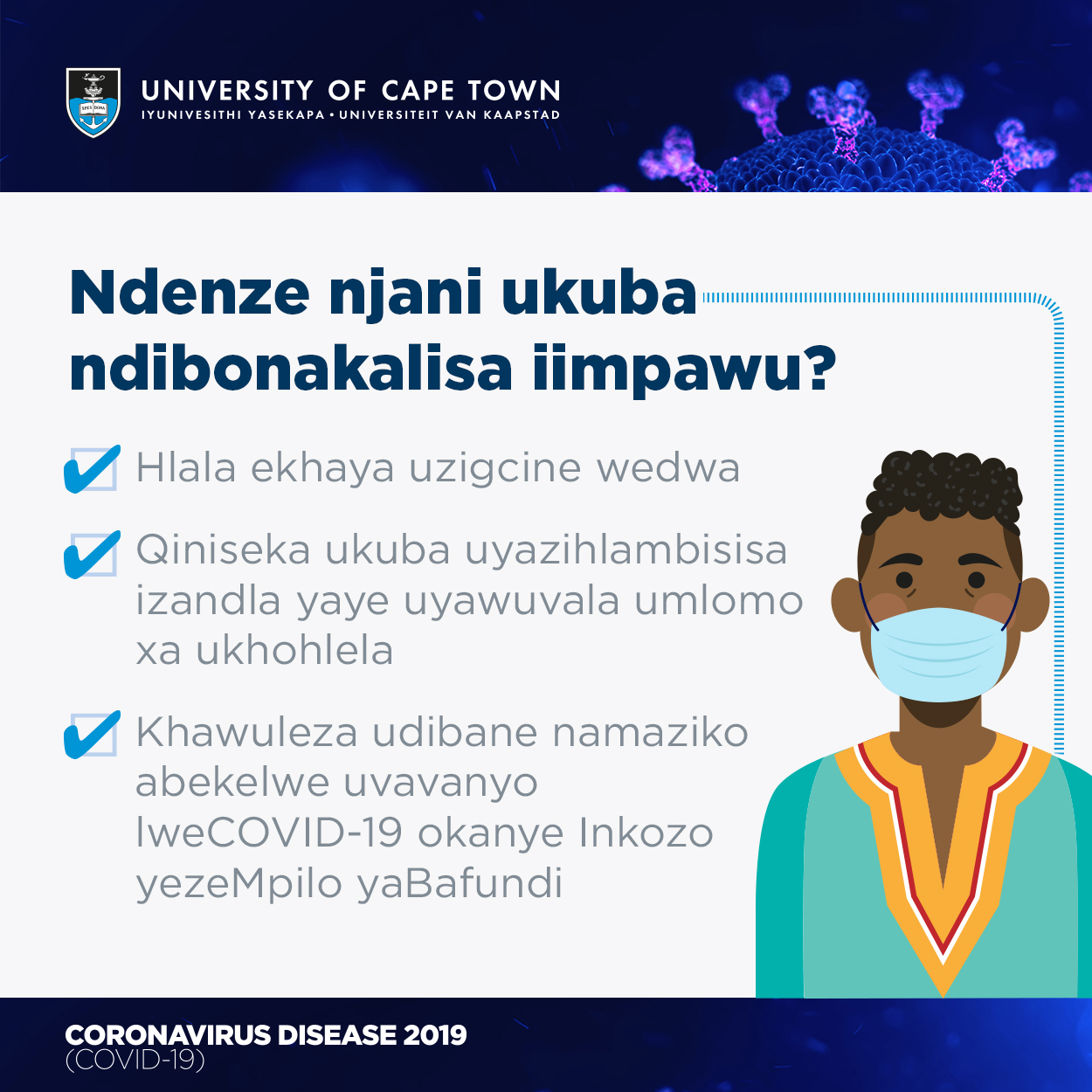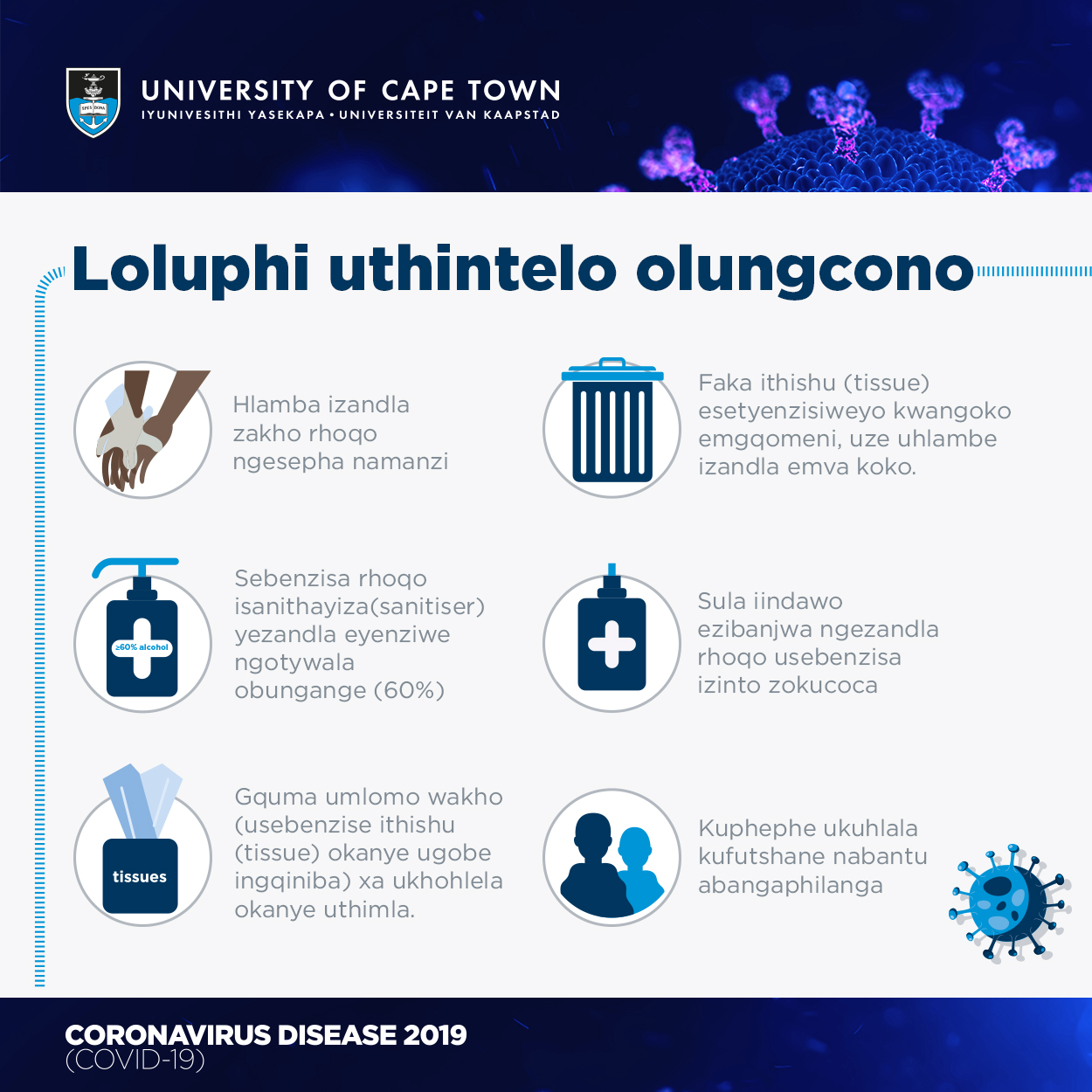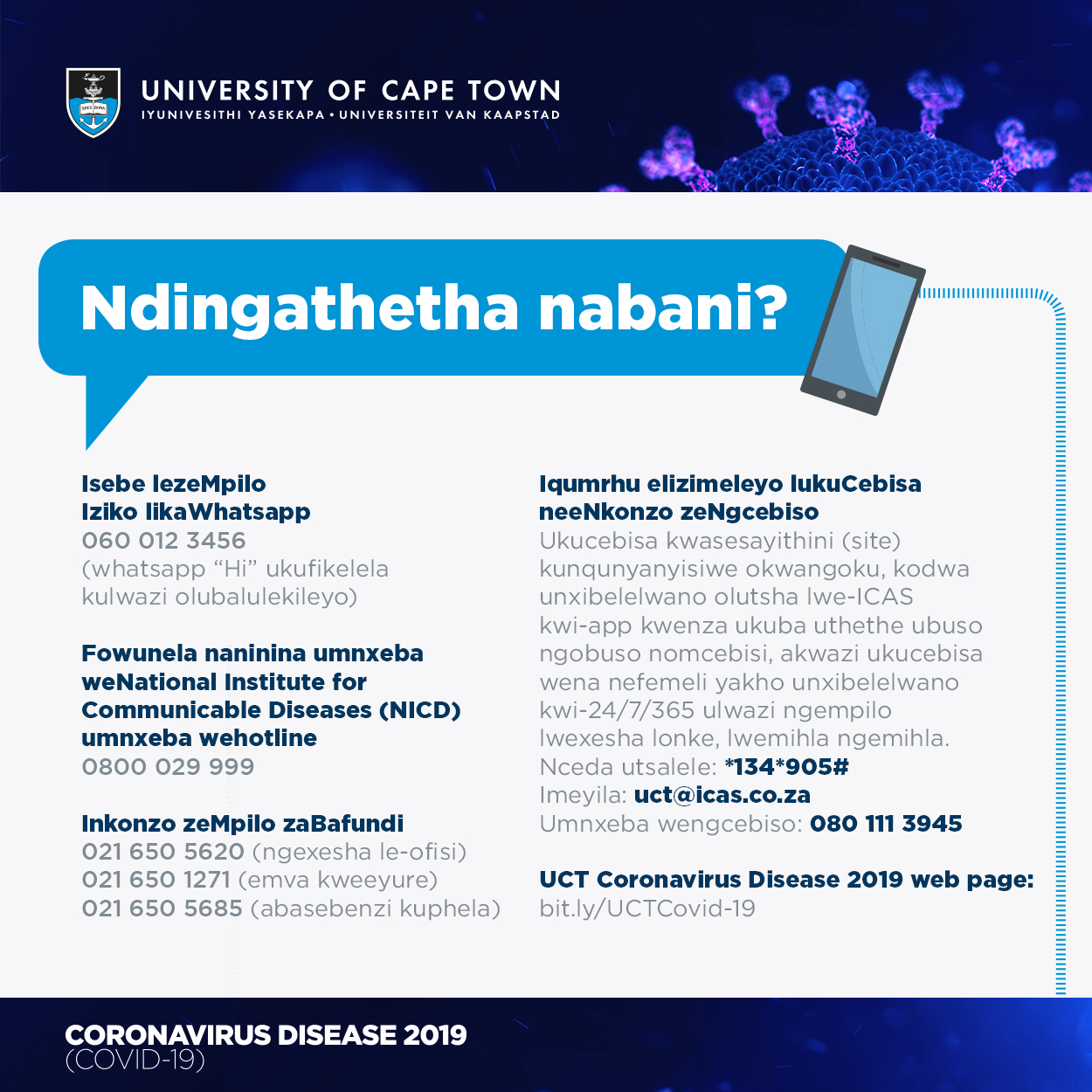Infographic: Coronavirus Disease 2019 (COVID-19)
20 March 2020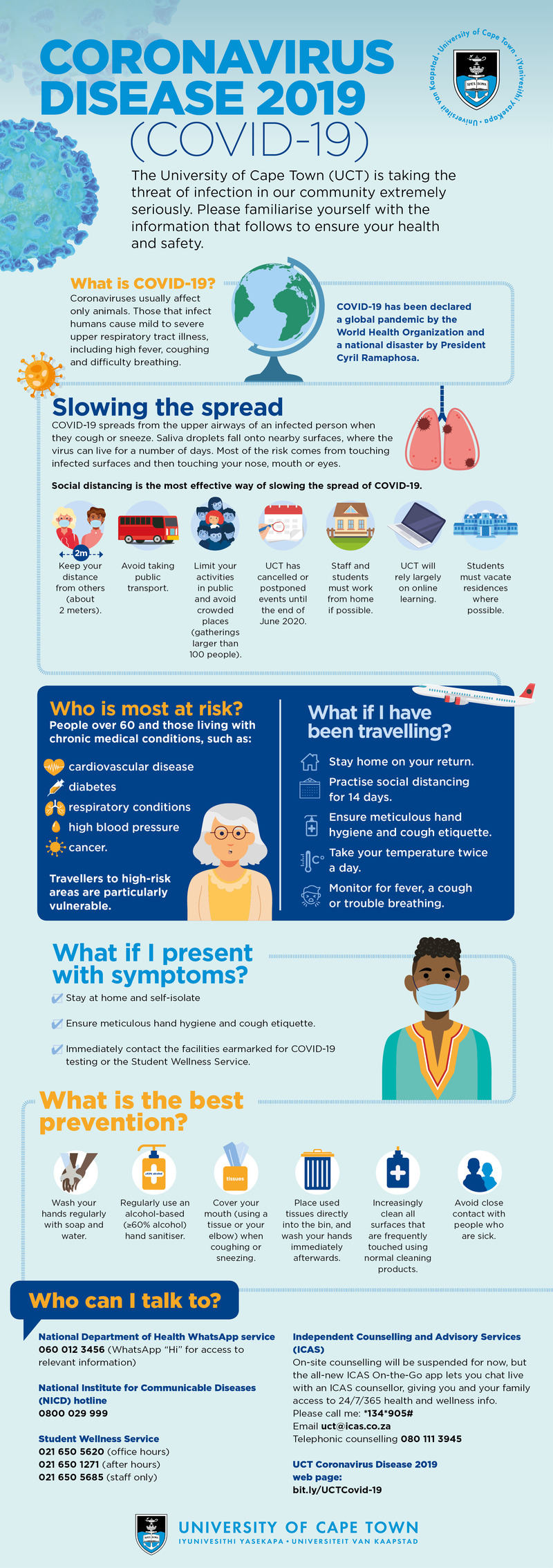
Download a hi-res version of this infographic.
Text only version
The University of Cape Town (UCT) is taking the threat of infection in out community extremely seriously. Please familiarise yourself with the information that follows to ensure your health and safety.
Coronaviruses are usually affect only animals. Those that infect humans cause mild to severe upper respiratory tract illness, including high fever, coughing and difficulty breathing.
COVID-19 has been declared a global pandemic by the World Health Organisation and a national disaster by President Cyril Ramaphosa.
COVID-19 spreads from the upper airways of an infected person when they cough or sneeze. Saliva droplets fall onto nearby surfaces, where the virus can live for a number of days. Most of the risk comes from touching infected surfaces and then touching your nose, mouth or eyes.
Social distancing is the most effective way of slowing the spread of COVID-19.
- Keep your distance from others (about 2 metres).
- Avoid taking public transport.
- Limit your activites in public and avoid crowded places (gatherings larger than 100 people).
- UCT has cancelled or postponed events until the end of June 2020.
- Staff and students must work from home if possible.
- UCT will rely largely on online learning.
- Students must vacate residences where possible.
People over 60 and those living with chronic medical conditions, such as:
- cardiovascular disease
- diabetes
- respiratory conditions
- high blood pressure
- cancer.
Travellers to high-risk areas are particularly vulnerable
- Stay home on your return.
- Practice social distancing for 14 days.
- Ensure meticulous hand hygiene and cough etiquette.
- Take your temperature twice a day.
- Monitor for fever, a cough or trouble breathing.
- Stay at home and self-isolate.
- Ensure meticulous hand hygiene and cough etiquette.
- Immediately contact the facilities earmarked for COVID-19 testing or the Student Wellness Service.
- Wash you hands regularly with soap and water.
- Regularly use an alcohol-based (≥ 60% alcohol hand-sanitiser).
- Cover your mouth (using a tissue or your elbow) when coughing or sneezing.
- Place used tissues directly into the bin, and wash your hands immediately afterwards.
- Increasingly clean all surfaces that are frequently touched using normal cleaning products,
- Avoid close contact with people who are sick.
National Department of Health WhatsApp service
060 012 3456 (WhatsApp "Hi" for access to relevant information)
National Institute for Communicable Diseases (NCID) hotline
0800 029 999
Student Wellness Service
021 650 5620 (office hours)
021 650 1271 (after hours)
021 650 5685 (staff only)
Independent Counselling and Advisory Services (ICAS)
On-site counselling will be suspended for now, but the all-new ICAS On-the-Go app lets you chat live with an ICAS counsellor, giving you and your family access to 24/7/365 health and wellness info.
Please call me: *134*905#
Email: uct@icas.co.za
Telephonic counselling: 080 111 3945
Get ICAS On-the-Go
 This work is licensed under a Creative Commons Attribution-NoDerivatives 4.0 International License.
This work is licensed under a Creative Commons Attribution-NoDerivatives 4.0 International License.
Please view the republishing articles page for more information.
UCT’s response to COVID-19
COVID-19 is a global pandemic that caused President Cyril Ramaphosa to declare a national disaster in South Africa on 15 March 2020 and to implement a national lockdown from 26 March 2020. UCT is taking the threat of infection in our university community extremely seriously, and this page will be updated with the latest COVID-19 information. Please note that the information on this page is subject to change depending on current lockdown regulations.
Minister of Health, Dr Joe Phaahla, has in June 2022 repealed some of South Africa’s remaining COVID-19 regulations: namely, sections 16A, 16B and 16C of the Regulations Relating to the Surveillance and the Control of Notifiable Medical Conditions under the National Health Act. We are now no longer required to wear masks or limit gatherings. Venue restrictions and checks for travellers coming into South Africa have now also been removed.
Read the latest document available on the UCT policies web page.
Campus communications
2022
UCT Community of Hope Vaccination Centre
On Wednesday, 20 July, staff from the University of Cape Town’s (UCT) Faculty of Health Sciences came together with representatives from the Western Cape Government at the UCT Community of Hope Vaccination Centre at Forest Hill Residence to acknowledge the centre’s significance in the fight against COVID-19 and to thank its staff for their contributions. The centre opened on 1 September 2021 with the aim of providing quality vaccination services to UCT staff, students and the nearby communities, as well as to create an opportunity for medical students from the Faculty of Health Sciences to gain practical public health skills. The vaccination centre ceased operations on Friday, 29 July 2022.
With the closure of the UCT Community of Hope Vaccination Centre, if you still require access to a COVID-19 vaccination site please visit the CovidComms SA website to find an alternative.
“After almost a year of operation, the University of Cape Town’s (UCT) Community of Hope Vaccination Centre, located at the Forest Hill residence complex in Mowbray, will close on Friday, 29 July 2022. I am extremely grateful and proud of all staff, students and everyone involved in this important project.”
– Vice-Chancellor Prof Mamokgethi PhakengWith the closure of the UCT Community of Hope Vaccination Centre, if you still require access to a COVID-19 vaccination site please visit the CovidComms SA website to find an alternative.
Frequently asked questions
Global Citizen Asks: Are COVID-19 Vaccines Safe & Effective?
UCT’s Institute of Infectious Disease and Molecular Medicine (IDM) collaborated with Global Citizen, speaking to trusted experts to dispel vaccine misinformation.
If you have further questions about the COVID-19 vaccine check out the FAQ produced by the Desmond Tutu Health Foundation (DTHF). The DTHF has developed a dedicated chat function where you can ask your vaccine-related questions on the bottom right hand corner of the website.
IDM YouTube channel | IDM website
“As a contact university, we look forward to readjusting our undergraduate and postgraduate programmes in 2023 as the COVID-19 regulations have been repealed.”
– Prof Harsha Kathard, Acting Deputy Vice-Chancellor: Teaching and Learning
We are continuing to monitor the situation and we will be updating the UCT community regularly – as and when there are further updates. If you are concerned or need more information, students can contact the Student Wellness Service on 021 650 5620 or 021 650 1271 (after hours), while staff can contact 021 650 5685.


